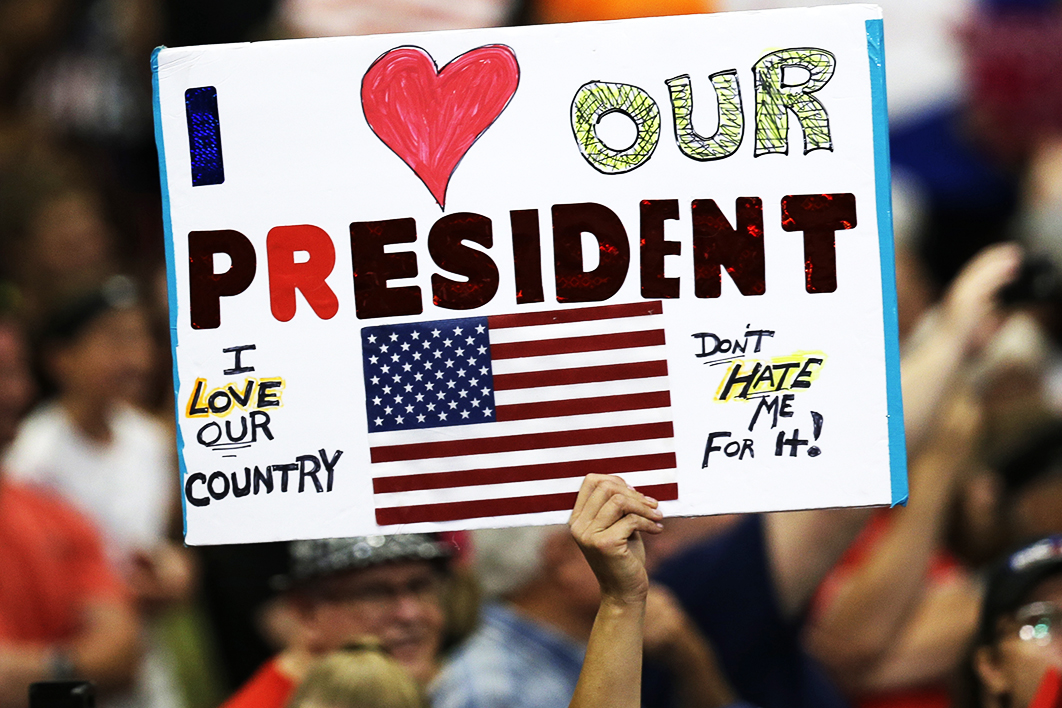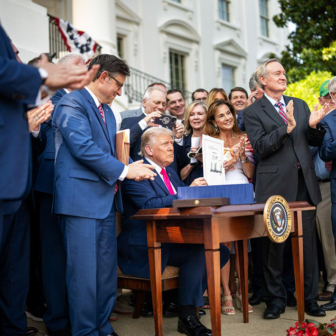It’s 5 August 2015 and Scott Adams, author, trained hypnotist, long-term student of the art of persuasion and creator of the Dilbert cartoon strip, is writing about Donald Trump on his blog. Despite the fact that most commentators are treating the businessman as a joke candidate, Adams writes that the US presidential contest already comes down to a battle between Clinton and Trump. He acknowledges that the mood is for a female president, but predicts that, if Hillary stumbles, it will be Trump and nobody else who wins. As the election draws closer, Adams continues to forecast that Trump will win in a landslide.
On the evening of 8 November, election day, reality slowly dawns. Hillary supporters cry. TV hosts are wide-eyed. An orange-tinted reality TV star? Has America lost its mind? A ripping sound is almost audible: the “establishment” has unmoored, and spun away. With the pundits, the politicians, their advisers, and the “fake news” media go the satirists, the never-Trump celebrities, millions of Democrats, and many Republicans too.
Sam Harris, New York Times bestselling author and host of the popular podcast Waking Up with Sam Harris, is incredulous. He’s no fan of Clinton, but even less of Trump. The new president is a “dangerous narcissist,” a “con-man without any core commitments other than to maintain his own fame and glory,” a “fabulist,” a “demagogue,” a “sexual predator,” an “awful” person,” “a liar who one would only expect to find in a mental hospital,” an “absolute jackass,” and a person with “less understanding of what is involved in being president than any candidate who has ever stood for election” (Episode 51: “The Most Powerful Clown”). Harris, like all the others, didn’t see this coming.
Months on, things are still spinning wildly. Trump has recast the presidency as a fast-moving drone releasing volleys of Twitter bombs on his opponents. His enemies return fire. The media hurries to each blast site. A new controversy explodes. And so it goes, on and on. Emojis, memes and tweets shoot bursts of abuse across no man’s land. There’s no time to make peace. Each side simply holds fast to its claims that the other is lying or deluded. Nobody is listening to anyone outside their own bunker.
In what Trump calls the “fake news” media, much of the analysis takes place within the bubble of wilful bafflement and disengagement. In this bubble, Hillary was robbed; Trump’s millions are suffering a mass delusion, are the sad victims of a con, or are the racist, sexist anachronisms of America: Hillary’s “basket of deplorables.” Why engage with them? Better to wait out the days until the next election, and try again.
The Trump supporters have one crucial advantage: they won, and most of the establishment refused until the very last minute to accept this could happen. Now, there is even more at stake: they might deliver Trump a second term. For the never-Trumpers, proceeding as before is not the clever option. Trump’s supporters must be engaged with, if only to understand how they might be convinced to vote differently next time.
American podcaster Sam Harris is one of the few who is having a crack at bridging the divide. Despite his regular slamming of Trump, Harris has come to realise that many of his fans are Trump supporters. Facing their accusations of bias, he recently agreed to interview Scott Adams in an effort to understand their perspective.
Adams has two key qualifications for the task. First, he is one of the golden few who correctly predicted the Trump victory. Second, he is recommended to Harris by many Trump supporters as able to clearly articulate their views, despite confessing that his own politics don’t entirely align with Trump’s.
What transpires between Harris and Adams, in episode 87 (“Trigger,” 19 July 2017) is a conversation notably removed from the white noise of Twitter. Harris sets up the interview as carefully as a truce negotiation. He is not out to do a “gotcha” interview, he tells Adams — he genuinely wants to understand. He asks Adams to explain as best he can how Trump supporters see Trump, and promises Adams fair opportunity to speak. Adams accepts the invitation, and explains, calmly, what he sees.
His case, unpacked carefully by Harris over more than two hours, may be summarised as follows. For Adams, Trump’s ascent was obvious. Trump may not have won in a landslide, but he won the game he was playing: the electoral college. This is because, as Adams had been saying all along, Trump is the greatest persuader of them all. But this doesn’t mean that Trump’s supporters have been conned. According to Adams, Trump’s supporters are not deluded, but rational. They have decided to put their emotional trust in him, because he is broadly headed in the direction they want him to go. This means they cut him a lot of slack. Rather than pinning Trump literally to pre-election promises on issues such as immigration, they see them as “opening bids” which he then adjusts by negotiation and “beta testing.”
Harris presses on this. What about the obviously blatant lies Trump tells? Surely he pays a penalty for this when he is found out? Sure, there is a penalty, says Adams, and Trump knows it. Trump knows he will be set on by the media. But he, and his supporters, understand that some facts don’t really matter. In Adams’s most controversial claim, he argues that Trump supporters hear Trump’s statements as “emotionally true,” even if those statements wouldn’t pass a fact check. But there is good in this, Adams claims. Because Trump’s supporters trust him at that level, he can lead them towards a more moderate position. Wouldn’t you prefer a president who can lead extremists back towards the centre, Adams asks Harris.
There’s a strangely disconcerting air to this part of the interview. In the introduction to the episode, recorded later, Harris confesses, only half joking, that at certain stages he felt as if Adams had hypnotised him.
Harris moves the conversation to more solid ground. What about Trump’s obvious and complete lack of ethics, of any inner life, his notorious and unbridled narcissism? How to explain the disconnect between the personal ethics of many Trump supporters and the way Trump behaves? Like the time when Trump claimed credit for a charitable donation he didn’t make, or when Trump University collapsed, leaving students ripped off?
Adams has answers here, too. Trump supporters are prepared to accept that some of Trump’s behaviour, and past actions, are not what others would term ethical. But they are not voting for him on character grounds. They want him to get a job done, and that is to change America. Trump never set out to win a morality contest. At this, Harris professes great unease. Since when did we decide it was all right for the president to be amoral? Counters Adams: why does anyone need the president to be a personal role model?
Harris turns to Trump’s contested wealth. If Trump is such a great businessman then why won’t he release his finances? Isn’t Trump boosting his credibility, and thus his fortune, by the very fact of becoming president? Adams counters that Trump’s supporters understand that even if Trump is going to profit from the presidency, this is Trump’s price for lending his skills to America.
Adams has the last word on behalf of Trump’s supporters. They are not suffering any hallucinations right now. Meanwhile, Trump’s detractors, Harris included, are still reeling from the “cluster bomb” of “cognitive dissonance” that hit them. If anyone is deluded, says Adams, it’s those who refused to see what was coming, and who continue to deny Trump’s abilities. It’s no mean feat to become president, and Trump did it.
Harris ends the interview largely unconvinced by Adams, and the title of the episode describes his visceral reaction to Trump in some segments of the discussion. But he never directs his contempt for Trump at the messenger, and the two never descend into personal animosity. Harris thanks Adams for coming on the show, and tells listeners about Adams’s new book. It’s an interesting and sadly rare conversation in which two sides, watching two different movies, take a moment to look over at what the other is watching.
A few episodes on, in episode 92 (“The Limits of Persuasion,” 17 August 2017), Harris reports back. All his fans are claiming he “won” the debate with Adams, while all Adams’s fans are claiming Adams “destroyed” Harris. It’s back to two different movies. But for a couple of hours, in this quiet podcast space, set up with careful respect to civil rules of debate, both sides listened. At least it was a conversation, in which two people didn’t sneer at each other, or try to shout each other down. It’s a start.
Meanwhile, on Twitter and the daily news, Charlottesville happens, the culture wars erupt, and the divide between right and left widens. We need more of these quiet conversations, not just in America, but here too. •




